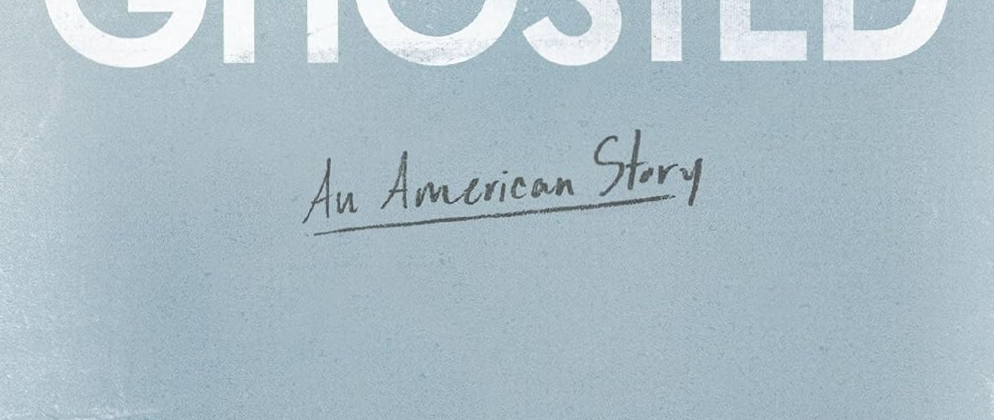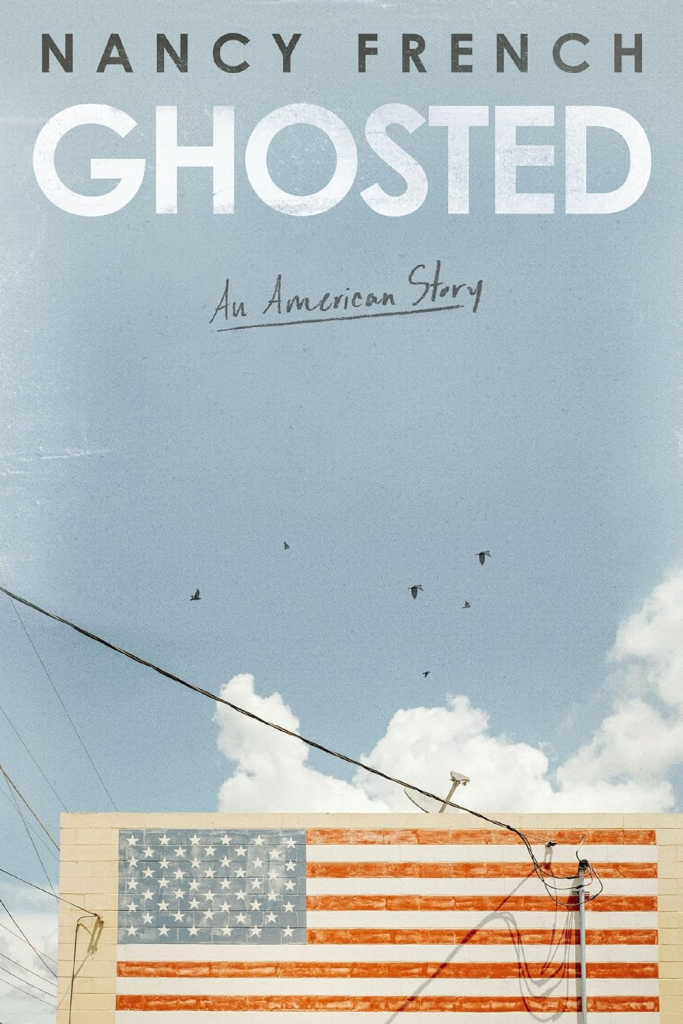

I’m usually reading about ten books at the same time, switching between them all. But once I opened Nancy French’s new memoir Ghosted: An American Story, I read it in two sittings. Really, the only reason it wasn’t in one sitting is because I started reading it on Good Friday, and we had some obvious Good Friday-related plans.
It was appropriate to read this book over Easter weekend. While French would probably not describe herself as a theologian, this is a theological kind of book—it is a story of God showing love to the weak and redeeming creation while also calling fallible people to restore justice already here on earth. Except—and this becomes a crucial part of the story French is telling—just because God places a call on someone to pursue justice doesn’t mean it will be easy. And that’s how a conservative NYT-bestselling ghostwriter has found herself out of her previous line of work and in the crosshairs of awful threats and insults, some of them still ongoing.
French’s early life was difficult—childhood in poverty, sexual abuse from someone from church, and then more abuse and traumatic loss that led her to drop out of college. And yet, she writes gently; the narrative of trauma in her early life is honest yet not overwrought. The reader is welcomed with care into the heartbreaking grief of a child discovering for the first time that life can be cruel, and not in the ways (and not in the places) she had expected it would be.
Right as she hits what feels like her lowest point as a twenty-year old student at Lipscomb University, she meets David French, a successful alumnus of the university and of Harvard Law School. David confronts her doubts about Christ, pushes through her defensive walls, and dramatically proposes to her after only three weeks after their first meeting—a proposal that was so shocking to their friends that they held an intervention to try and stop them.
No matter. David and Nancy have a dream wedding in Paris (France, not Tennessee), and move to New York City. There David begins a demanding career as an attorney, while Nancy is an isolated stay-at-home wife, fielding phone calls from scandalous women calling her home phone number at all hours of day and night, asking for David. It turns out to have been a real case of wrong numbers, and I will not spoil this story for those who have not yet read the book—trust me, it’s a good one!
Life gets busy, as David’s career takes off and moves them around—from NYC to Cornell University in Ithaca, NY, just for starters. They also have two children. Following the family’s move to Philadelphia in 2002, Nancy’s dream of becoming a writer slowly starts forming, beginning with a column “The Liberty Belle” in the Philadelphia City Paper—there Nancy wrote about “being a southern conservative in a liberal city.” The family’s next move, finally, takes them back to rural Tennessee. The reason? David has joined the military out of a sense of duty, and they wisely realized that his deployment would be easier on Nancy and the kids if they are closer to family. Following his deployment, per their children’s request, David and Nancy adopt one more child to complete their family—a little girl from an orphanage in Ethiopia.
Around this time, Nancy’s ghost-writing for prominent Republican politicians begins to take off, and some of the memoir’s funniest stories come from her experiences in doing this work—skiing with the Romneys, eating moose hot dogs with the Palins, and toasting morning bagels for Steve Bannon. But all people’s lives are complicated—more so than typical press coverage likes to show. And in working on Bristol Palin’s memoir, which would become her first NYT bestseller, Nancy found Bristol’s story to contain elements of trauma that were readily relatable to her own. She was shocked, therefore, at how reactions to Bristol’s vulnerability were politicized after the book’s publication:
“Bristol was well spoken and the book was clear. However, a nuanced, trauma-informed conversation did not arise from her revelations. Bristol told the truth, and Democrats laughed. After seeing how people mocked this young mother, I was fully confident the Democrats were not only wrong on the issue of women, they were callously wrong. They harbored and protected abusers of women, and Republicans alone would stand against sexual injustice.
In spite of my certainty, the truth turned out to be much more complicated than I thought.”
Trump entered the scene right as Nancy’s ghost-writing career for conservative politicians was at its height, and swiftly disproved her previous assumptions about what Republicans stood for. But while she did not change her previous political convictions, she found her party moving in a different direction without her. To her surprise she found increasingly more of her clients, friends, and even fellow church members decided to support Trump, excusing his immoral behavior and a track record of abusive words and actions towards women. Shocked, she wondered how the party that stood for character could decide that in this particularly blatant case, character suddenly wasn’t so important after all.
It will get worse, as her public writing of her own opinions—no more as a ghost, but speaking for herself, in her own name—will result in online smear and harassment campaigns targeting her, David, and their children, even as David himself has a “blink-and-you’ll-miss-it” moment of considering running for the presidency as an independent. All of this whirlwind will leave her feeling as if her world has changed overnight.
“I sank into this new landscape without a tribe, without backup, without a political home.
‘Do you think you’ll have friends after all of this?’ a friend asked.
‘Maybe,’ I said. ‘But they’re going to be totally different friends.’”
It is this new phase of life without her previous friends or career that lands Nancy her next writing assignment, a work of research and journalism unlike anything she has ever done, but one which her previous personal trauma had equipped her to understand most viscerally—investigating decades of abuse and coverup at Kanakuk, an evangelical Christian camp in Branson, MO, that has hosted as many as twenty-five thousand kids per summer. Yet again, her pursuit of inconvenient truth will place her at odds with fellow churchgoers, even while giving hope and a sense of redemption to some victims’ families.
But no less important, her investigation into Kanakuk will equip her to investigate a more personal story: whatever happened to her childhood abuser? More painful and shocking revelations will follow, another story of bystanders knowing about sin but refusing to do anything about it, choosing to cover up instead.
Nancy French’s story, raw and personal as it is in this book, is distinctive and powerful in its own right. But it also bears significant parallels to the experiences of other conservative Christian women who have suffered similar losses—including career-related ones—because they spoke up against Trump: Beth Moore and Karen Swallow Prior. Such is the legacy of unchecked misogyny.
So what is the point of such a memoir, and what is the point of publishing it now, in another highly divisive election year? As it happens, that is the subject of Nancy French’s other book that is also coming out this month—The Afterparty: Toward Better Christian Politics, co-authored with Curtis Chang. Based on the project that Curtis Chang created with David French and Russell Moore, this particular book presents a curriculum for churches and for individuals to have better, healthier conversations about politics; conversations that will not drive lifelong brothers and sisters in Christ away from each other.
A reflection exercise at the end of one chapter illuminates the book’s vision and approach, as it poses the following questions:
“1. What are some local problems in your neighborhood or locality that affect everyone, regardless of their positions on national politics?
2. Which of these problems tug at your heart?
3. What are some opportunities to work on these local problems alongside others (including those who may hold different political views)?
4. Ask God if he might be inviting you to explore getting involved.”
To the readers of Ghosted, it will be readily apparent that Nancy French has been living with #4 in mind her entire adult life.